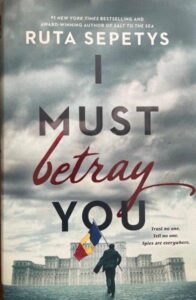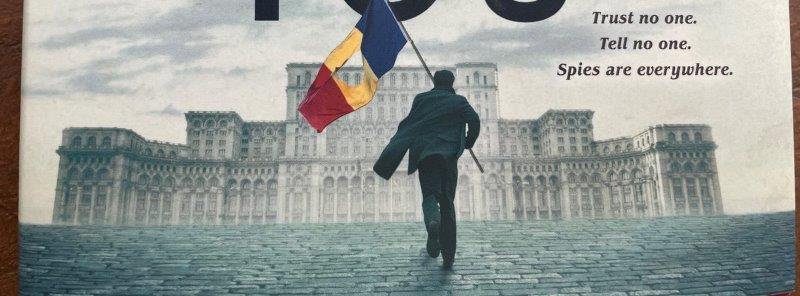“If communism is Paradise, why do we need barriers, walls, and laws to keep people from escaping?” from I Must Betray You by Ruta Sepetys
I hate the smell of cooked cabbage. She watched us work from her balcony as she hung laundry out to dry, and the stench from her apartment made me want to gag. If I had understood, would it have made a difference? Would I have been more tolerant of the smell? It was 1985 and I spent four weeks in Poland with a group of US students to help rebuild a school. The “watchers” were everywhere, usually easy to spot. Most in military uniforms with an AK-47 strapped across their chest. Some in plain clothes, smoking cigarettes on the corner. They followed us everywhere. To the market, to the small church that Poland allowed. But I was a typical teenager, concerned about my hair and boys back home, oblivious to why she cooked cabbage every day.
The depressing conditions wore us down, made us feel sad, but I didn’t fully grasp what it was like to live there day in and day out. I would return to my home in America to a refrigerator full of food and restaurants on every corner. In Poland, there was no McDonald’s, no Waffle House open all night. These things didn’t exist in a communist country. Some days we complained about baked oatmeal for the third meal in a row. Our leaders would shrug. “No bread today. No meat either,” they’d say. If they didn’t get in line early enough, the food ran out. Everything was rationed, even toilet paper. When it ran out, or you didn’t have enough ration cards because you’d spent them on medical treatment for yourself or a family member, you ate cabbage.
We never knew what happened to the people that helped us that summer. Were they imprisoned for aiding and embedding Americans? Did the secret police call them into their office and question family members? The trip affected me greatly, but over the years, the memories faded as I returned to my American way of life.
Until I read Ruta Sepetys’ I Must Betray You.
 Seventeen-year-old Cristian Florescu dreams of becoming a writer, but Romanians aren’t free to dream. Cristian is blackmailed by the secret police to become an informer. He’s left with only two choices: betray everyone and everything he loves—or use his position to creatively undermine the most notoriously evil dictator in Easter Europe. He eagerly joins the revolution to fight for change. But what is the cost of freedom?
Seventeen-year-old Cristian Florescu dreams of becoming a writer, but Romanians aren’t free to dream. Cristian is blackmailed by the secret police to become an informer. He’s left with only two choices: betray everyone and everything he loves—or use his position to creatively undermine the most notoriously evil dictator in Easter Europe. He eagerly joins the revolution to fight for change. But what is the cost of freedom?
“Mistrust is a form of terror. The regime pits us against one another. We can’t join together in solidarity because we never know whom we can trust or who might be an informer.” from I Must Betray You
This tragic historical fiction novel takes place in 1989, the year the Soviet Union collapsed. One by one, as each country gained its independence and ousted their communist leaders, the Romanian dictator held on tight. The student led revolution on December 21, 1989 inspired Sepetys’ I Must Betray You. Young people gave their lives for freedom, forever giving the Romanian people a voice.
In 1989, I was a college student, the age of most who died in the Romanian revolution, yet I had no idea what was happening on the other side of the world. While I curled my hair for a sorority party, Romanian girls were shot in cold blood for betraying their communist leader. While I bought a new dress for the formal, Romanian boys traded cigarettes for a bite of food. The realization humbled me and brought me to tears.
While this young adult historical fiction novel is heart-breaking, it offers a beautiful glimpse into bravery, courage, and standing up for one’s beliefs. My hope is that publishers will release more novels like this one, with inspiring characters for teens to emulate! May we learn from history and never repeat the mistakes of the past.

Great observations!
Sad to say, much of what Julane witnessed in person, still exist in Communist controlled counties today. The book, I Must betray You, should be “required reading” for every high school student in America.